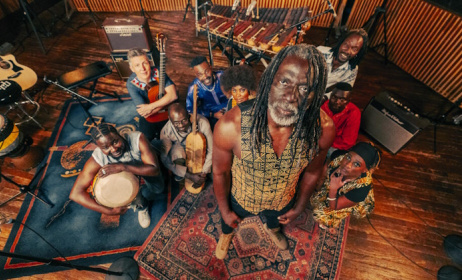Birth and rebirth inspire Duncan Souchon’s Innosense
Duncan Marcel Souchon’s third album Innosense suggests the ideal context for itself: a calmative collection of songs that the songwriter harnessed to connect with his unborn son. The 13-track offering is multi-layered and its compositions are also a consequential soundscape inspired by the trauma of inequality in South Africa. The music offers a potent spell of reconciliatory works steeped in notions of peace – giving the listener an air of tranquillity.
 Duncan Marcel Souchon. Photo: Monique Bermeister
Duncan Marcel Souchon. Photo: Monique Bermeister
The Cape Town-based multi-instrumentalist has been composing music since the early 1990s, some of which has been featured in ad campaigns and other visual film media. Souchon has previously delved into the themes of love, slavery, freedom and the supernatural, but this year he returns with a work of art that began as a meditative exercise.
From birth to infancy, music was the language Souchon used to relate to his son, forming a strong mental connection and heartfelt retrospective journey. The musician’s creation of Innosense was built upon the sounds that his child responded to based on his daily emotional states. Like his previous albums, When the World Was Young and Piano Eclipsed, Souchon began by pinpointing his innate feelings and state of consciousness, expressing them through unadulterated notes and sounds, which then became scales and melodies with growing structures. This formed a bond between father and son – which with the release of the album transcends that experience and can be felt vicariously by individuals of different backgrounds. Here lies the essence of his musical vision.
To execute this vision, Souchon involved SAMA-winning recording engineer and producer Dave Langemann who co-produced and recorded the bulk of the album. Souchon’s long-time collaborator Daniel Eppel made a wealthy contribution to the album by playing various instruments on a number of songs, while South African accordionist, guitarist and ex-struggle activist Tony Cedras layered thick, acoustic textures. Every musician’s contribution, including that of lead guitarist Thomas Cousins, elevated what was a rudimentary work to produce a compelling instrumental narrative. As a cherry on top, Steve Newman, the veteran South African acoustic guitarist and founding member of Tananas, came in as the last contributor to add subtle but powerful acoustic guitar touches to the album, with contributions on ‘Barrydale’ and ‘Starting Out’.
Behind the swoon of the atmospheric music – which includes shakers, musical bows, sensitive piano lines and warm but tortured trumpets, among other instruments – is an intergenerational story of collaboration through the language of music. The ability to relate is a central theme, and the intention to connect and find commonality is the album’s cornerstone.
“The magic of the album comes from its creative process – from natural, inward songs that relate to young children to a place of forming structure and organisation that represents that healing,” Souchon says.
The songs on Innosense are varied. ‘Fresh Air‘ is just that – relief and a breath of hope, while ’Siemiany’ provides a soundtrack for introspection. ‘Loss‘ is a staircase of ups and downs: hard realisations, making peace with the inevitable, and understanding that without loss there cannot be birth anew. ‘Soaring Spirits’, the album’s interlude, is a momentary pause aggravated by the sound of a Khoisan bow, where one’s sense of time ceases to exist.
Innosense invites listeners to go beyond their own frame of reference and tap into something bigger. It’s a journey through internal upheavals and the contradictions of life. But holistically, it provides a message of hope and beauty without the need for explicit verbal pornography – showing us that profound concepts are sometimes best carried by musical instruments alone.
Listen to Innosense here.
























Commentaires
s'identifier or register to post comments